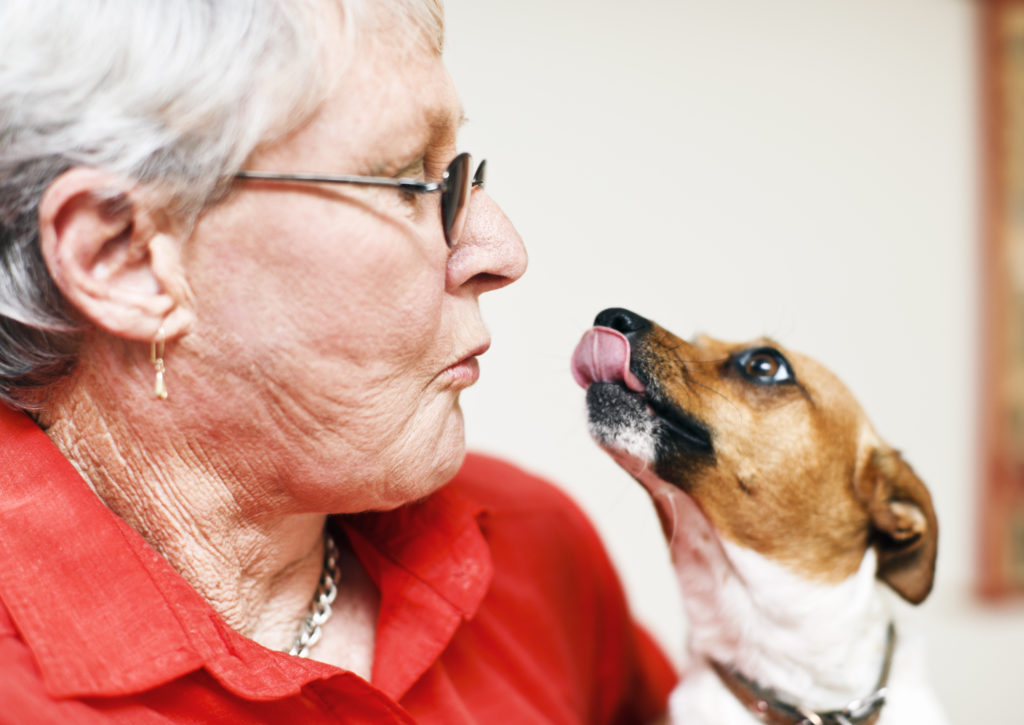Imagine for a moment what its like for an elderly person with pets to care for. Your husband died last year and your daughter and her family live interstate. You’ve been quite independent up till now, but you had a fall and need a hip replacement.

Your main companion is a little Jack Russell, let’s call him Zippy, he’s a little old now himself, prefers a snuggle by the heater to chasing butterflies, but still likes his daily outing to the shops and the park.
How do you care for Zippy when you can’t take him for walks anymore, you can’t even bend down to clean up his messes out in the garden? What if you must go into hospital for a few weeks, who will look after him then? The doctor is telling you that perhaps it’s time for Zippy to find another home, after all, you’ll be more susceptible to illness after your surgery.
For most of us, getting rid of our fur babies is incomprehensible and the science agrees. The benefits of pet ownership are many and varied and, with care, far outweigh any risks.
Physiological Benefits
The cardiovascular benefits of pet ownership are equal to cutting out salt or alcohol. Patients live longer after a heart event, have lower blood pressure, lower cholesterol and decreased muscle tension. Studies show that elderly patients have a decreased heart rate and a higher skin temperature whilst petting a dog or watching fish in an aquarium.
What’s more, elderly pet owners have less visits to the doctor than patients without pets.
Psychological Benefits
Just being around pets, let alone petting them, lowers anxiety and the risk of stress related illness. Pet owners report less depression and appear to cope with grief, stress and loss better than non-pet owners. Pets increase levels of happy hormones like dopamine and endorphins and less of the stress hormone cortisol.
Animal Assisted Therapy can reduce loneliness and significantly reduce fear and stress in the elderly. Alzheimer’s patients are calmer, have better social interactions and have fewer nutritional issues when there is a pet in the home.
The bereaved also benefit from the love of their animals. Recently widowed subjects with pets, had fewer physical and psychological issues and had a lower incidence of depression.
Social Benefits
Animals help us to interact socially, disabled people get more smiles and nods from strangers when they have a dog with them, the elderly will find people stop to talk and pat their dog. Our pets increase our social connectedness and are a great conversation starter!
They also keep us company when we are sad and lonely. We all know the resting of a dogs muzzle on our knee or the comforting purr of a cat can lift your mood and your hopes.
Homeless people often report that their pet is their only friend, and would not consider accommodation that would not include their pet.
The Role of the Medical Professional
Traditionally doctors have not paid attention to pet ownership as a health aid, but it is now recommended that doctors add a question about pet ownership to their patient intake forms. There are simple guidelines for reducing risk to patients with autoimmune diseases who have pets in their home. When families and communities support animal ownership, the benefits are strengthened.
Back to Zippy. Zippy doesn’t know this, but his owner is typical of elderly women. Women live longer than men so tend to be on their own, are more likely to have mobility issues after the age of 65, they are even more likely to own dogs. The greater prevalence of disabling conditions like fractures, osteoporosis, back problems, arthritis, depression and more, means a diminished quality of life among aging women compared to men.
Add to this, older women are the fastest growing group of homeless Australians. A shortage of affordable housing, the ageing population and the significant gap in wealth accumulation between men and women across their lifetimes are considered serious impacts. What does this mean for their relationship with their beloved animals.
Zippy doesn’t want to leave his mum, but he has his own needs. Regular nutrition, access to clean drinking water, a clean – excrement free environment and regular social interaction and exercise.
Luckily Zippy’s mum has some help. He has his own Health Assist carer to come and take him for a walk, make sure the backyard is clean of ‘bombs’ and give him a brush and some love several times a week. At Health Assist we recognise that having a pet can satisfy the need to be needed. While pets give affection and act as a social aid, they are also a responsibility. We want to keep patients and pets together to take advantage of the healing benefits or their precious companions. That’s what Health Assist is all about, helping Australians get back to good health.
- Steele, Russell W. “Should immunocompromised patients have pets?.” The Ochsner journal vol. 8,3 (2008): 134-9.
- The Health Benefits of Companion Animals – http://www.shanti.org/programs-services/pets-are-wonderful-support/
- RSPCA – https://kb.rspca.org.au/knowledge-base/what-are-the-health-benefits-of-pet-ownership/
- Murtagh KN, Hubert HB. Gender differences in physical disability among an elderly cohort. Am J Public Health. 2004;94(8):1406–1411. doi:10.2105/ajph.94.8.1406
- https://www.humanrights.gov.au/our-work/age-discrimination/projects/risk-homelessness-older-women